Carroll County, Iowa
Carroll County is a county located in the U.S. state of Iowa. As of the 2010 census, the population was 20,816.[1] Its county seat is Carroll.[2] The county is named in honor of Charles Carroll of Carrollton, signer of the Declaration of Independence.
Carroll County | |
|---|---|
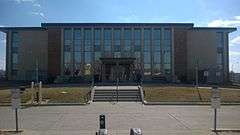 | |
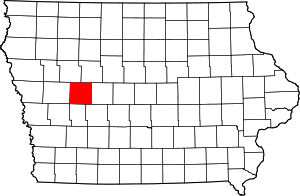 Location within the U.S. state of Iowa | |
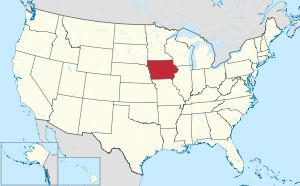 Iowa's location within the U.S. | |
| Coordinates: 42°02′14″N 94°51′32″W | |
| Country | |
| State | |
| Founded | 1851 |
| Named for | Charles Carroll of Carrollton |
| Seat | Carroll |
| Largest city | Carroll |
| Area | |
| • Total | 570 sq mi (1,500 km2) |
| • Land | 569 sq mi (1,470 km2) |
| • Water | 0.8 sq mi (2 km2) 0.1% |
| Population (2010) | |
| • Total | 20,816 |
| • Estimate (2018) | 20,154 |
| • Density | 37/sq mi (14/km2) |
| Time zone | UTC−6 (Central) |
| • Summer (DST) | UTC−5 (CDT) |
| Congressional district | 4th |
| Website | www |
History
Carroll County was formed on January 15, 1851 from sections of Pottawattamie County. It was named after Charles Carroll[3] of Carrollton, Maryland, the only Roman Catholic and longest-living signer of the Declaration of Independence. In 1855, the county government was established in Carrollton and in 1858, the first courthouse was built. In 1869, the seat was moved to Carroll City (today Carroll) which was centrally located and connected to the Chicago and North Western Transportation Company. The courthouse was destroyed in 1886 by fire. The present courthouse was erected in 1965. However the courthouse is set to go under construction in the near future
Geography
According to the U.S. Census Bureau, the county has a total area of 570 square miles (1,500 km2), of which 569 square miles (1,470 km2) is land and 0.8 square miles (2.1 km2) (0.1%) is water.[4]
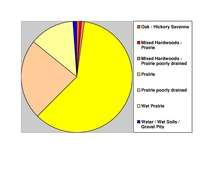
Major highways
.svg.png)
.svg.png)

Adjacent counties
- Sac County (northwest)
- Calhoun County (northeast)
- Greene County (east)
- Guthrie County (southeast)
- Audubon County (south)
- Crawford County (west)
Demographics
| Historical population | |||
|---|---|---|---|
| Census | Pop. | %± | |
| 1860 | 281 | — | |
| 1870 | 2,451 | 772.2% | |
| 1880 | 12,351 | 403.9% | |
| 1890 | 18,825 | 52.4% | |
| 1900 | 20,319 | 7.9% | |
| 1910 | 20,117 | −1.0% | |
| 1920 | 21,549 | 7.1% | |
| 1930 | 22,326 | 3.6% | |
| 1940 | 22,770 | 2.0% | |
| 1950 | 23,065 | 1.3% | |
| 1960 | 23,431 | 1.6% | |
| 1970 | 22,912 | −2.2% | |
| 1980 | 22,951 | 0.2% | |
| 1990 | 21,423 | −6.7% | |
| 2000 | 21,421 | 0.0% | |
| 2010 | 20,816 | −2.8% | |
| Est. 2018 | 20,154 | [5] | −3.2% |
| U.S. Decennial Census[6] 1790-1960[7] 1900-1990[8] 1990-2000[9] 2010-2018[1] | |||
2010 census
The 2010 census recorded a population of 20,816 in the county, with a population density of 36.58/sq mi (14.125/km2). There were 9,376 housing units, of which 8,683 were occupied.[10]
2000 census
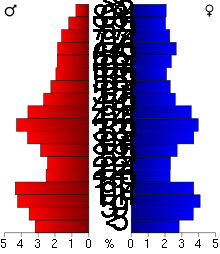
As of the census[11] of 2000, there were 21,421 people, 8,486 households, and 5,668 families residing in the county. The population density was 38 people per square mile (15/km²). There were 9,019 housing units at an average density of 16 per square mile (6/km²). The racial makeup of the county was 98.87% White, 0.18% Black or African American, 0.10% Native American, 0.34% Asian, 0.20% from other races, and 0.31% from two or more races. 0.54% of the population were Hispanic or Latino of any race.
There were 8,486 households out of which 32.90% had children under the age of 18 living with them, 57.00% were married couples living together, 6.80% had a female householder with no husband present, and 33.20% were non-families. 29.60% of all households were made up of individuals and 15.50% had someone living alone who was 65 years of age or older. The average household size was 2.46 and the average family size was 3.07.
In the county, the population was spread out with 26.90% under the age of 18, 7.40% from 18 to 24, 25.90% from 25 to 44, 21.00% from 45 to 64, and 18.70% who were 65 years of age or older. The median age was 39 years. For every 100 females there were 95.10 males. For every 100 females age 18 and over, there were 92.00 males.
The median income for a household in the county was $37,275, and the median income for a family was $47,040. Males had a median income of $30,074 versus $21,528 for females. The per capita income for the county was $18,595. About 4.50% of families and 6.50% of the population were below the poverty line, including 6.10% of those under age 18 and 8.20% of those age 65 or over.
Communities
Townships
Carroll County is divided into sixteen townships:
Population ranking
The population ranking of the following table is based on the 2010 census of Carroll County.[12]
† county seat
| Rank | City/Town/etc. | Municipal type | Population (2010 Census) |
|---|---|---|---|
| 1 | † Carroll | City | 10,103 |
| 2 | Manning | City | 1,500 |
| 3 | Coon Rapids (partially in Guthrie County) | City | 1,305 |
| 4 | Glidden | City | 1,146 |
| 5 | Arcadia | City | 484 |
| 6 | Breda | City | 483 |
| 7 | Templeton | City | 362 |
| 8 | Dedham | City | 266 |
| 9 | Halbur | City | 246 |
| 10 | Lidderdale | City | 180 |
| 11 | Lanesboro | City | 121 |
| 12 | Willey | City | 88 |
| 13 | Ralston (partially in Greene County) | City | 79 |
Politics
| Year | Republican | Democratic | Third Parties |
|---|---|---|---|
| 2016 | 63.0% 6,638 | 31.4% 3,309 | 5.7% 597 |
| 2012 | 52.5% 5,601 | 46.4% 4,947 | 1.2% 126 |
| 2008 | 47.4% 4,922 | 51.0% 5,302 | 1.7% 171 |
| 2004 | 54.8% 5,762 | 44.6% 4,689 | 0.7% 73 |
| 2000 | 51.0% 4,879 | 46.7% 4,463 | 2.4% 226 |
| 1996 | 38.6% 3,392 | 49.3% 4,333 | 12.1% 1,065 |
| 1992 | 36.3% 3,439 | 40.1% 3,800 | 23.6% 2,236 |
| 1988 | 39.9% 3,701 | 58.6% 5,437 | 1.5% 135 |
| 1984 | 49.8% 5,021 | 49.2% 4,960 | 1.0% 96 |
| 1980 | 51.5% 5,017 | 39.9% 3,885 | 8.6% 835 |
| 1976 | 42.6% 4,094 | 55.5% 5,333 | 1.9% 181 |
| 1972 | 47.6% 4,415 | 49.6% 4,608 | 2.8% 262 |
| 1968 | 42.7% 3,927 | 52.3% 4,809 | 5.1% 466 |
| 1964 | 23.4% 2,387 | 76.5% 7,807 | 0.1% 13 |
| 1960 | 39.7% 4,648 | 60.3% 7,064 | 0.1% 9 |
| 1956 | 53.3% 5,816 | 46.6% 5,085 | 0.1% 12 |
| 1952 | 64.3% 7,473 | 35.6% 4,139 | 0.1% 16 |
| 1948 | 40.6% 3,974 | 58.4% 5,711 | 1.0% 101 |
| 1944 | 50.0% 4,833 | 49.7% 4,799 | 0.3% 27 |
| 1940 | 49.2% 5,376 | 50.6% 5,526 | 0.2% 21 |
| 1936 | 31.0% 3,259 | 59.8% 6,285 | 9.1% 959 |
| 1932 | 23.8% 2,265 | 75.5% 7,174 | 0.6% 60 |
| 1928 | 39.5% 4,014 | 60.3% 6,134 | 0.2% 21 |
| 1924 | 41.1% 3,590 | 22.8% 1,994 | 36.1% 3,160 |
| 1920 | 72.9% 6,320 | 25.1% 2,174 | 2.0% 177 |
| 1916 | 53.1% 2,408 | 46.0% 2,085 | 0.9% 42 |
| 1912 | 15.5% 664 | 54.3% 2,326 | 30.2% 1,292 |
| 1908 | 41.9% 1,865 | 56.4% 2,510 | 1.6% 73 |
| 1904 | 51.2% 2,290 | 45.6% 2,040 | 3.2% 141 |
| 1900 | 47.3% 2,224 | 51.8% 2,434 | 0.9% 40 |
| 1896 | 45.7% 2,066 | 53.4% 2,417 | 0.9% 41 |
References
- "State & County QuickFacts". United States Census Bureau. Archived from the original on September 5, 2015. Retrieved July 14, 2014.
- "Find a County". National Association of Counties. Archived from the original on May 31, 2011. Retrieved June 7, 2011.
- Gannett, Henry (1905). The Origin of Certain Place Names in the United States. Govt. Print. Off. pp. 70.
- "US Gazetteer files: 2010, 2000, and 1990". United States Census Bureau. February 12, 2011. Retrieved April 23, 2011.
- "Population and Housing Unit Estimates". Retrieved June 22, 2019.
- "U.S. Decennial Census". United States Census Bureau. Retrieved July 14, 2014.
- "Historical Census Browser". University of Virginia Library. Retrieved July 14, 2014.
- "Population of Counties by Decennial Census: 1900 to 1990". United States Census Bureau. Retrieved July 14, 2014.
- "Census 2000 PHC-T-4. Ranking Tables for Counties: 1990 and 2000" (PDF). United States Census Bureau. Retrieved July 14, 2014.
- "Population and Housing Occupancy Status: 2010 - State -- County". United States Census Bureau American FactFinder. Retrieved March 8, 2011.
- "U.S. Census website". United States Census Bureau. Retrieved January 31, 2008.
- "Archived copy". Retrieved February 10, 2013.
- Leip, David. "Dave Leip's Atlas of U.S. Presidential Elections". uselectionatlas.org. Retrieved April 25, 2018.
External links
| Wikimedia Commons has media related to Carroll County, Iowa. |
